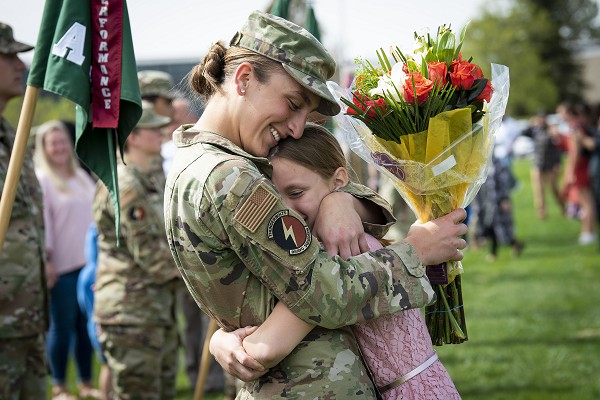 While they enjoy many advantages, military kids negotiate multiple schools, relocations and repeated deployments growing up. In this photo by Joshua Armstrong, U.S. Air Force Emily Adams embraces a family member following graduation from Preparatory School for the United States Air Force Academy.
While they enjoy many advantages, military kids negotiate multiple schools, relocations and repeated deployments growing up. In this photo by Joshua Armstrong, U.S. Air Force Emily Adams embraces a family member following graduation from Preparatory School for the United States Air Force Academy.
Colorado Springs, CO. (July 13, 2022). Military kids grow up fast, are resilient and adaptable, and enjoy many advantages. They are well-travelled, receive a good education and enjoy free health care, safe housing, and parents with steady incomes. They are, nevertheless, children and subject to the same emotional roller coaster as other kids.
While civilian youth navigate first dates, bullies and school gossips, military kids must also contend with frequent relocations and long periods of separation from a parent during multiple deployments. The impact of repeated, back-to-back deployments has been called the “Military Families Syndrome”, a term coined during the Viet Nam War to characterize the behavioral and psychological problems of children of deployed parents.
According to Dr. Michael Faran, a psychiatrist, retired colonel and chief of the Child, Adolescent and Family Behavioral Health Office at Army Medical Command, "Kids often experience more anxiety and some studies suggest about 30 percent of children will have difficulties as a result of deployment. Dr. Faran cited increased rates of depression and anxiety, a decrease in academic performance, and sometimes the use of use of drugs and alcohol as evidence of this phenomenon.
Experts say military kids often suffer from separation anxiety, depression, excessive worry, sleep problems, and other physical complaints both during deployments and after parents return home.
This is especially true for children whose parents come home from war with Post Traumatic Stress Disorder, depression, or who suffered a traumatic brain injury. For these children, multiple deployments mean family upheaval, personal chaos, and parents whose personalities change when they return home.
Children are like sponges, soaking up both the good and the bad in their parents’ attitudes. Military children are often confused when a returning parent suffering from PTSD becomes distant, distracted or even suddenly hostile for no apparent reason. Too often, these children blame themselves for the effects multiple deployments are having on their family life.
America’s armed forces are addressing these problems through a collaborative effort between primary care and psychiatry physicians at military bases to identify and help heal families in trouble.
Everyday Americans can do their part. Support Our Troops is a national charity dedicated to sustaining active-duty military and their families though our Care Package program. You can help by going to our secure site supportourtroops.org/donate today.


